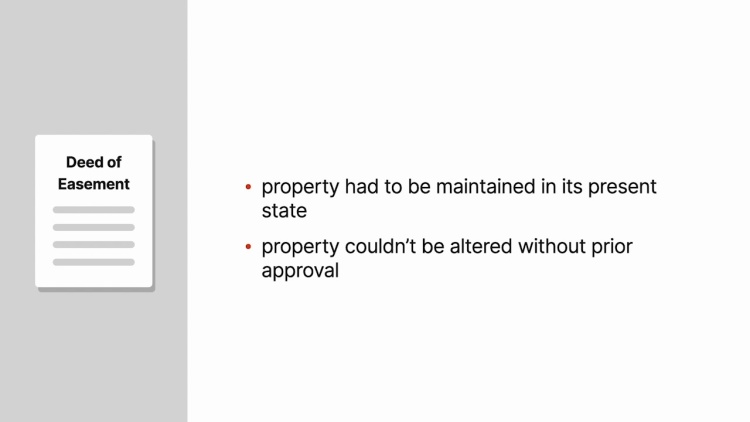United States v. Blackman
Virginia Supreme Court
613 S.E.2d 442 (2005)
- Written by Rebecca Green, JD
Facts
In the 1970s, the Historic Green Springs, Inc. (HGSI) was organized to preserve a local historical area. HGSI obtained easements for land conservation and historic preservation. To that end, in 1973, the Atkins family granted an easement to HGSI over several acres of the Atkinses’ Eastern View Farm, which included a manor house. The deed to HGSI conveyed an easement in gross in perpetuity. The deed also said that the property should be maintained and preserved in its present state, and the property could not be altered without the grantee’s prior written approval. In 1978, HGSI conveyed its entire portfolio of easements to the United States (plaintiff). All the original easement grantors acknowledged their agreement to the transfer by signing the deed. The National Park Service (NPS) now administers the easements. In 2002, Peter Blackman (defendant) purchased Eastern View Farm. Blackman submitted several sets of renovation plans for the farm’s manor house to the NPS for review. The NPS repeatedly denied Blackman’s plans. Instead of waiting for NPS approval, Blackman proceeded with his renovations. The United States sued, and the federal district court issued a temporary restraining order prohibiting Blackman from continuing renovation without written approval from the NPS. The district court then certified a question of law to the Virginia courts regarding whether, in 1973, Virginia law allowed a deed granting a negative easement in gross to a third party for land conservation and historic preservation. Blackman argued that a negative easement in gross for land conservation and historic preservation was not valid until 1988, when the Virginia Conservation Easement Act (VCEA), Code §§10.1-1009 through 10.1-1016, was enacted.
Rule of Law
Issue
Holding and Reasoning (Koontz, J.)
What to do next…
Here's why 907,000 law students have relied on our case briefs:
- Written by law professors and practitioners, not other law students. 47,100 briefs, keyed to 996 casebooks. Top-notch customer support.
- The right amount of information, includes the facts, issues, rule of law, holding and reasoning, and any concurrences and dissents.
- Access in your classes, works on your mobile and tablet. Massive library of related video lessons and high quality multiple-choice questions.
- Easy to use, uniform format for every case brief. Written in plain English, not in legalese. Our briefs summarize and simplify; they don’t just repeat the court’s language.





